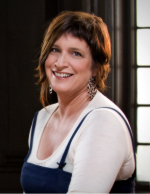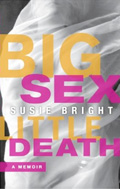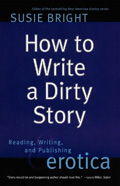TW Interview by Lorraine Berry
For me, writing about sex is as natural a part of the literary process as writing about other experiences in our lives. We are sexual creatures: How can we not write about sex? That's why I looked forward to interviewing Susie Bright, the feminist erotic pioneer. It’s difficult to think of an author who has contributed more to positive images of women, sexuality, and literature than Susie.
 Bright has written numerous books, including her recent memoir Big Sex Little Death. She was actively involved in the groundbreaking lesbian magazine On Our Backs during the 1980s and is the editor of the annual anthology The Best American Erotica, which she started in 1993. She lectures at colleges and universities across the country, maintains a blog, and hosts a weekly radio show called In Bed with Susie Bright. On top of all that, she’s a mom.
Bright has written numerous books, including her recent memoir Big Sex Little Death. She was actively involved in the groundbreaking lesbian magazine On Our Backs during the 1980s and is the editor of the annual anthology The Best American Erotica, which she started in 1993. She lectures at colleges and universities across the country, maintains a blog, and hosts a weekly radio show called In Bed with Susie Bright. On top of all that, she’s a mom.
In an October 2007 essay for Literary Mama, “My Mommy’s Job,” Bright talks about the balancing act between writing and motherhood. At age ten, her daughter Aretha was assigned a school report on what her parents did for a living. She was embarrassed to reveal to her class that her mom wrote about sex. As Bright recalls:
In truth, I had been waiting for my daughter to come to me with this problem since I first became pregnant. I remember how people would ask me—before they even inquired about christening names, or if I knew what sex the baby was—’Aren’t you worried about what your child will think of what you do?’ They would look at me gravely, as if a great sorrow were about to unfold.
At the end of a long discussion, Aretha understands that she’s not the only kid who might have trouble with the assignment. Other children have parents with controversial or “gross” jobs—or parents who are unemployed. In Bright’s essay, she concludes their conversation by telling Aretha:
‘Look, I don’t care what you say about me, but I want you to promise me that you won’t laugh at a single other student’s paper, because you know now how hard it is to write something like this.’ I crooked out my little finger to her so that we could make a pinky-swear vow.
 In these political times, when something as simple as speaking out in favor of access to contraceptives can be problematic, Bright’s unflinching commitment to incorporating erotica into her oeuvre fills me with admiration—as does the sensitivity and honesty with which she handled her daughter’s questions. I’ve written erotica myself, and I enjoy reading it, and Bright inspires me with her celebration of women’s passion.
In these political times, when something as simple as speaking out in favor of access to contraceptives can be problematic, Bright’s unflinching commitment to incorporating erotica into her oeuvre fills me with admiration—as does the sensitivity and honesty with which she handled her daughter’s questions. I’ve written erotica myself, and I enjoy reading it, and Bright inspires me with her celebration of women’s passion.
We first spoke by phone in January, but the bulk of the condensed interview that appears here took place via email, right after a presidential candidate had made some strong pronouncements about sex and society. Bright, who’s been subjected to this sort of vitriol her entire career, offered a refreshing antidote and, for me, a much-needed perspective.
TW: Has it always been political for a woman to write about sex? Or does it just feel that way right now?
SB: Always. I don’t think there’s ever been a woman, right back to Eve and Scheherazade, who was public about her sexual knowledge and didn’t face the wrath of the mob. And it’s certainly been like that in my generation.
TW: Why do you think these questions about women’s sexuality never really seem to go away?
SB: Because of capitalist property relations. Sorry to be so blunt, but it’s true. It’s the notion that children are men’s property, that their inheritance and the “money” they accrue must be protected for their “rightful” heirs. If men control fertility, birth assignment, and women’s sexuality, they maintain the property line they’ve erected. It’s so barbaric. The whole world’s fortunes are at stake.
TW: But why especially now? Any insight?
SB: The absurd anti-Obama campaign. And Obama’s a centrist! He’s no radical or women’s liberationist, sadly. But he’s become a prop for the True Believer backlash, which means a lot of money for the opportunists.
Really, follow the money on these stories. That’s where all the ugliness hides.
TW: In Girl Land, Caitlin Flanagan argues that girls used to have a real girlhood rather than the sexualized childhood of today. Do you have any memory of this golden girlhood? Because I’m 48, and I don’t remember it.
SB: Well, it depends on the girl, doesn’t it? Lucky girls in the U.S., baby boomer middle-class girls, had remarkable access to education and freedom. That now appears to have been a golden moment, rather than an enduring change. It did change pop culture; it changed personal lives. But the backlash has been severe.
Children everywhere, and girls everywhere, have been exploited and bamboozled according to the times they lived in.
TW: Is it risky to write about sex? Do you think it has affected the way you are perceived in the literary world?
SB: Well, of course, you’re blacklisted and ghettoized, only to be paraded out when someone needs a martyr or a whipping post.
But if you write phony-baloney titillation all day for gossip rags, for example, no harm will come to your career. However, you are unlikely to make history!
TW: How do you want to be thought of in the literary world? How would you define yourself?
SB: I hope my obituary is written by someone who actually read my work. I probably have a good chance of that, but it will also take some luck. There are many people who simply know I had a guest appearance on Six Feet Under or some other TV show, and they have no idea why. What the hell is a “feminist sex writer”? Or an erotic literary fiction editor?
I know I occupy a strange position of underground notoriety, while at the same time I’m an odd footnote in the mainstream.
I wish I was more influential, but every revolutionary feels like that. I’m lucky that I’ve had any platform or influence at all. My career reflects a much deeper movement that reflects the times I lived in.
Among my peers, among writers and artists, I feel nothing but respect—as a writer, editor, and publisher, as an activist. If I was embraced by the National Football League and Coca-Cola and Barbie Dolls, you’d know something was very wrong!
It was good to write my memoir, Big Sex Little Death. Good to get it all down. I am probably not going to live more than 15 more years, so I have a sense of getting things squared away. Time flies by.
TW: Can literary writers write about sex, or does such an attempt just condemn you to the Guardian Literary Review’s Bad Sex Award?
SB: They do, all the time. There is no art without sex. I mean, can you imagine asking that question of Nabokov? Or Stein? Or Wilde? Or anyone who writes, seriously? It’s like asking if you can write without drama or comedy. Sex is a part of life. The Guardian’s attempt to make a sniggering contest out of it is ridiculous.
TW: What advice would you give to a writer who wants to explore a character’s sexuality? Any tips for what distinguishes bad sex writing from good sex writing?
SB: I’ve answered that question so often that I finally wrote a book about it: How To Write a Dirty Story. If you read the whole thing, I will give you extra homework!
 On (and Off) the Bright Side
On (and Off) the Bright Side
- Susie Bright’s Blog
- Susie Bright, Big Sex Little Death: A Memoir (Seal Press, 2011).
- Susie Bright: On the Birth of "On Our Backs," YouTube clip from panel discussion at MOMENTUM: "Making Waves in Sexuality,
- Feminism & Relationships Through New Media," Washington, DC, April 3, 2011.
- Susie Bright, “My Mommy's Job,” Literary Mama, October 6, 2007.
- Chelsea Allison, “Charting Girl Land: Caitlin Flanagan on Her New Book,” Vogue, January 12, 2012.
- The Guardian Bad Sex Award
- Susie Bright,How To Write a Dirty Story: Reading, Writing, and Publishing Erotica (Simon and Schuster, 2002).
The first person in my mother’s family to come to California was my great-aunt Tessie Halloran, who went to make her living as a governess in a Hollywood home. She came over to Minnesota one Christmas 'a great success,' loaded down with navel oranges and wearing a two-piece suit the color of a peach. No one in my family had ever worn any other color than blue or black or brown. The children didn’t know that peach-colored fabric existed, and when they touched Tessie’s outfit, they worried that it would melt away like ice cream.
—from Big Sex Little Death: A Memoir by Susie Bright
Art Information
- Photo of Susie Bright © Jason Ganwich; used by permission
